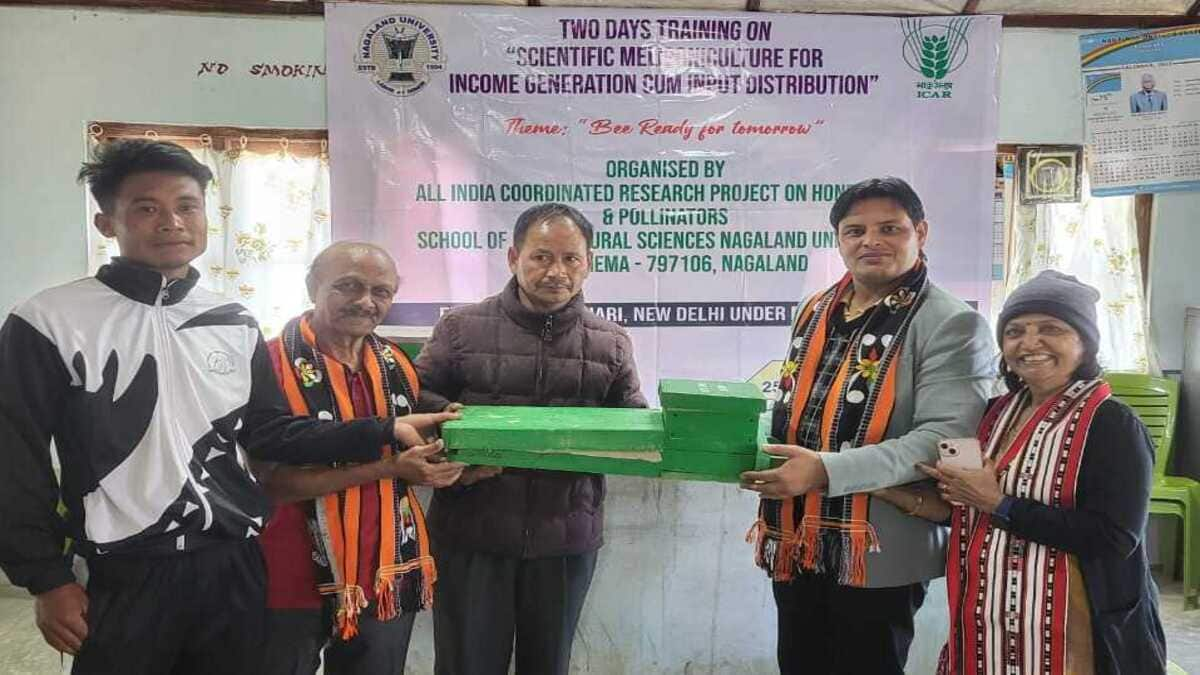Nagaland University identifies stingless bee species that boost crop yield, farmers’ profit
Gauri Mittal | May 27, 2025 | 12:48 PM IST | 2 mins read
Honey produced by stingless bee species – Tetragonula iridipennis Smith and Lepidotrigona arcifera Cockerell – is free from impurities, contains medicinal properties.

Scientists at Nagaland University have identified stingless bee species that can be used to increase agriculture yield and quality of crops through pollination. The honey produced by stingless bees is free from impurities and contains medicinal properties, making it more profitable, the study has also revealed.
The bee species have been identified as Tetragonula iridipennis Smith and Lepidotrigona arcifera Cockerell. The research, conducted over seven-10 years, showed that unlike normal bees, stingless bee colonies led to minimised bee losses and helped increase farmers’ profits.
This research was led by Avinash Chauhan, scientist and principal investigator (AICRP Honeybees and Pollinators), department of entomology, school of agricultural sciences, Nagaland University.
Nagaland University study on bees
In king chilli crops, the per cent fruit was increased by 8.46% when pollinated by stingless bees. Likewise in the chilli crop (Capsicum annuum), the fruit set and healthy fruits increased by 7.42% and 7.92%, respectively, the study revealed. Seed weight increased by a staggering 60.74% when the crop was pollinated by stingless bees.
While the research observed that the chilli plant had much better yield and quality when pollinated, similar observations were also made regarding other crops, such as cucumber, ash-gourd, watermelon, citrus, tomato, pumpkin, brinjal, dragon fruit etc. Stingless bees’ potential as pollinators was recorded on plants like mango, guava, rhus, gooseberry, and ber as well.
Also read IIT Guwahati develops sustainable solution using mushroom waste for wastewater treatment
“The research outcomes of the last seven to ten years provided different stakeholders with lots of opportunities to rear the stingless bees for quality honey production without fear of mixing impurities in honey and minimising bee losses, which led to more profitability in this profession. We are still working to improve the beekeeping rearing techniques and to promote scientific beekeeping with honey bees and stingless bees for better honey production and pollination of crops,” said Chauhan.
Stingless bees are majorly found in North East India, Eastern India, and Southern India. In the states of Nagaland, Meghalaya and Arunachal Pradesh, stingless bee keeping is gaining traction, with more stakeholders realising their agricultural importance with rising research.
Follow us for the latest education news on colleges and universities, admission, courses, exams, research, education policies, study abroad and more..
To get in touch, write to us at news@careers360.com.